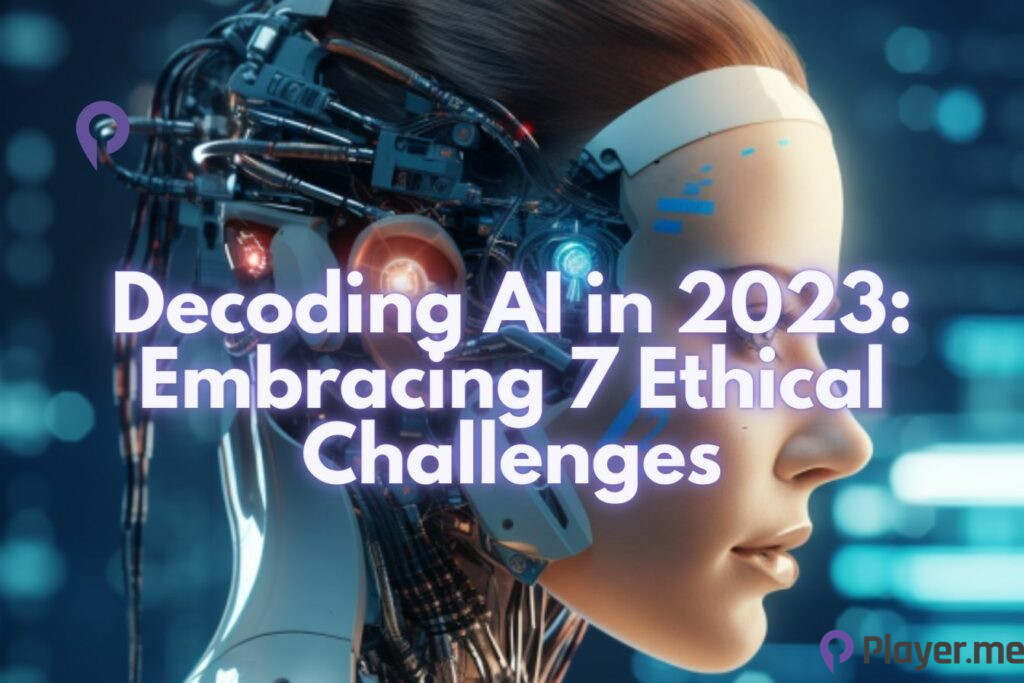Tom Cruise’s latest Mission Impossible film has jumped on the ethical challenges in Artificial Intelligence (AI) bandwagon, breaking the pattern of the evil antagonist being either an ambitious human or a malevolent alien species. The new antagonist is none other than an all-powerful AI known as the “Entity”.

AI has rapidly transformed the way we live, work, and interact with technology. From virtual assistants and recommendation algorithms to autonomous vehicles and advanced medical diagnostics, AI applications have grown exponentially.
However, this technological progress has also ignited a range of ethical concerns that demand our attention. As we navigate the ever-evolving landscape of AI, we must confront the ethical labyrinth it presents and carefully weigh the potential consequences.
We live and die in the shadows, for those we hold close–and those we never meet.
Tom Cruise
Also Read: The Future of AI: Emerging Technologies and Exciting Possibilities
7 Ethical Challenges in Decoding AI
1) AI Bias: The Inherited Prejudice
One of the most significant ethical challenges concerns surrounding AI is bias. AI algorithms are only as good as the data they are trained on, and if this data is biased, the AI’s decision-making processes can perpetuate and even amplify existing prejudices. For instance, AI used in hiring processes might inadvertently discriminate against certain groups based on historical hiring data, reinforcing societal inequalities.
Addressing AI bias requires rigorous data selection and ongoing monitoring of AI systems. Additionally, diverse teams of developers and ethicists must work collaboratively to identify and mitigate biases. Transparency in AI decision-making is also crucial, allowing users to understand why certain choices are made.
2) Transparency and Explainability
AI systems often operate as black boxes, making decisions without providing explanations for their choices. This lack of transparency raises concerns about accountability and trust. In critical domains such as healthcare and law enforcement, where AI decisions can significantly impact lives, understanding the reasoning behind AI outputs is vital.

Efforts are underway to develop “Explainable AI”, models that provide clear explanations for their decisions. Striking the right balance between performance and interpretability remains a challenge, but progress in this area is essential to gain public trust and facilitate ethical challenges in AI deployment.
3) Autonomy vs. Human Control
AI increasing autonomy raises questions about the level of control we retain over these systems. As AI becomes more capable, it may handle complex tasks independently, leading to concerns about decision-making processes beyond human comprehension.

Balancing AI autonomy with human oversight is crucial. Ethical frameworks should emphasise human control and ensure that AI systems remain tools that augment human abilities rather than replace human judgment entirely.
There is no reason and no way that a human mind can keep up with an AI machine by 2035.
Gray Scott
4) Privacy and Surveillance
AI-driven surveillance technologies can significantly impact individual privacy rights. Facial recognition, biometric data collection, and social media monitoring raise concerns about the erosion of personal freedoms and civil liberties.

To safeguard privacy, regulations must be established, and AI applications must undergo rigorous privacy impact assessments. Striking a balance between public safety and personal privacy is essential in our pursuit of ethical AI development.
5) AI in Warfare and the Question of Responsibility
The use of AI in military applications, particularly autonomous weapons systems, presents profound ethical challenges and dilemmas. As AI’s capabilities grow, the decision to delegate lethal actions to machines raises moral questions about responsibility and accountability for the consequences of these actions.

The international community must work together to develop norms and regulations surrounding the use of AI in warfare. Establishing clear boundaries and ensuring meaningful human control over AI systems in military contexts is critical to prevent unintended escalation and catastrophic consequences.
6) Transcending Borders: Global Collaboration
Ethical challenges and concerns in AI development are not confined to national boundaries. AI’s reach extends globally, and collaboration among nations is crucial in addressing shared ethical challenges.
International efforts must focus on standardising ethical guidelines, data sharing, and transparency in AI development. By fostering global collaboration, we can create a more responsible and accountable AI ecosystem that benefits all of humanity.
7) Preserving Human Values in AI
As we delve deeper into the ethical challenges of AI, it becomes evident that technology alone cannot address these challenges. Preserving human values in AI development requires a collective effort from policymakers, researchers, developers, and society as a whole.
Education and public awareness campaigns can empower individuals to make informed choices about AI usage and encourage them to demand ethical practices from AI developers. Furthermore, interdisciplinary collaborations between technologists, ethicists, and policymakers can help ensure that AI development aligns with human values and aspirations.
Conclusion
The rise of AI presents humanity with incredible opportunities for progress, but it also demands careful consideration of the ethical challenges it brings. By acknowledging and addressing bias, ensuring transparency and human control, safeguarding privacy, and fostering global collaboration, we can steer AI development in a direction that aligns with our values and respects our shared humanity.
As we unravel the AI dilemma and navigate the ethical labyrinth, our collective actions today will define the course of AI’s impact on society, shaping a future where technology works in harmony with our core values, aspirations, and concerns.
Frequently Asked Questions
What Are the Major Ethical Concerns in AI Development?
AI development raises several ethical concerns, including AI bias, lack of transparency and explainability, questions about autonomy versus human control, privacy and surveillance issues, and the use of AI in warfare and its consequences.
How Can We Address AI Bias?
Addressing AI bias requires careful data selection, diverse teams of developers and ethicists, and ongoing monitoring of AI systems. Transparency in decision-making processes is crucial, allowing users to understand why certain choices are made.
What Is the Significance of AI Transparency and Explainability?
AI systems often operate as black boxes, making decisions without providing explanations. Developing “Explainable AI”, models are essential to gain public trust and facilitate ethical AI deployment, particularly in critical domains such as healthcare and law enforcement.





